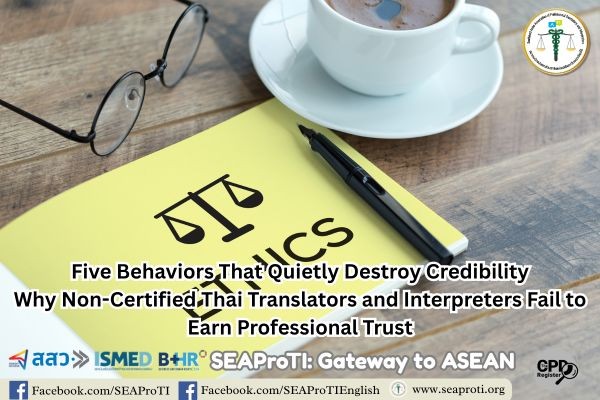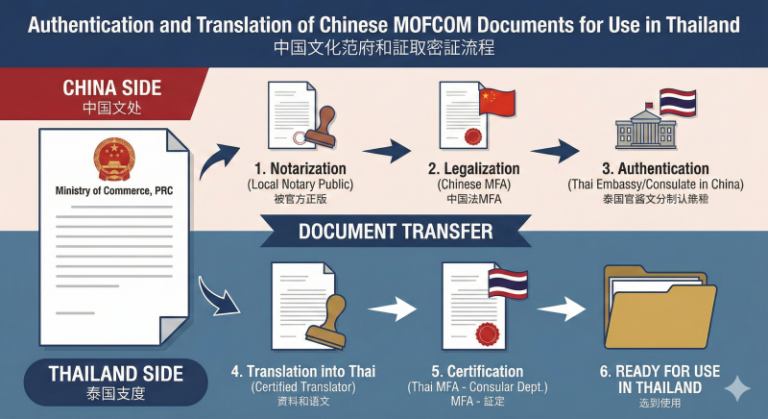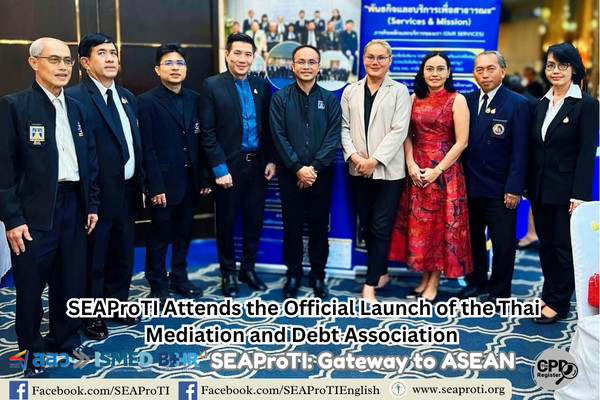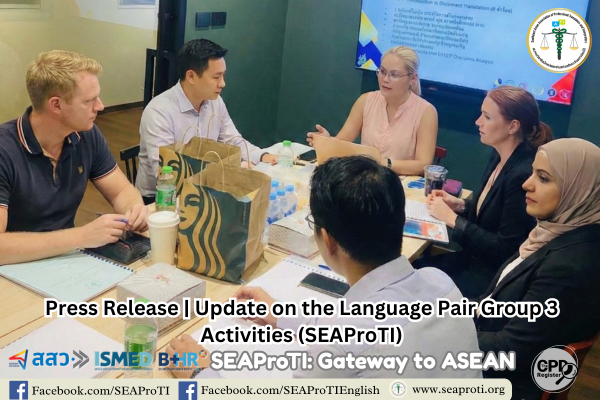Five Behaviors That Quietly Destroy Credibility
Why Non-Certified Thai Translators and Interpreters Fail to Earn Professional Trust
9 November 2025, Bangkok – Five Behaviors That Quietly Destroy Credibility And Why Interpreters and Translators Who Are Not Certified Are Considered Unreliable in the Justice System
Society often assumes that individuals with high positions, academic credentials, or professional seniority naturally possess integrity and responsibility. In reality, credibility can be damaged by subtle behaviors that many people do not even realize they are exhibiting.
For interpreters and translators especially those working in courts, government agencies, and across the justice system credibility is the most valuable asset. A single breach can permanently compromise a professional’s reputation.
Importantly, interpreters and translators who are not Certified lack the foundational safeguards that prove integrity, ability, and ethical conduct. Without these mechanisms, they carry a much higher risk of the credibility-damaging behaviors outlined below.
These are the five behaviors that most severely undermine trust, and the reasons they are directly linked to the unreliability of non-Certified Thai practitioners.
1. Lying, Distorting, or Withholding Information
A fundamental reason non-Certified practitioners are seen as untrustworthy
Providing incomplete information, altering facts, or concealing details to avoid responsibility constitutes a serious breach of professional ethics. In interpreting and translation, such acts directly compromise the accuracy and integrity of communication.
In court, even a single instance of distorted interpretation will permanently disqualify an interpreter.
Non-Certified interpreters and translators
- have no verified ethical history,
- have not undergone background or integrity screening, and
- have no certification body attesting to their reliability.
For these reasons, courts cannot assume that a non-Certified practitioner will uphold truthfulness in critical settings.
2. Breaking Promises and Failing to Honor Commitments
Why non-Certified interpreters are perceived as unreliable
Punctuality, adherence to deadlines, and follow-through are essential markers of professionalism. Individuals who miss deadlines, cancel appointments, or fail to deliver as promised inevitably lose trust, regardless of the explanation offered.
Non-Certified interpreters and translators lack:
- a verifiable track record,
- professional accountability mechanisms, and
- certification-based assurances of discipline and reliability.
As a result, courts and government agencies cannot confidently assume that a non-Certified practitioner will be punctual, dependable, or consistent in their performance.
3. Gossiping, Speaking Behind Others’ Backs, or Revealing Confidential Information
A key reason courts view non-Certified individuals as unable to protect sensitive data
Unprofessional comments, the disclosure of case details, or discussing parties in a negative manner can severely damage credibility. In judicial and administrative settings, confidentiality is not optional. It is an ethical and legal obligation.
Non-Certified individuals often:
- have not undergone formal ethics training,
- are not subject to confidentiality requirements, and
- are not bound by professional disciplinary frameworks.
Therefore, courts have no assurance that these individuals can maintain confidentiality in sensitive cases.
4. Shifting Blame and Avoiding Responsibility
A behavior that immediately disqualifies interpreters from judicial work
When errors occur, responsible professionals acknowledge and correct them. Blame-shifting demonstrates immaturity, lack of accountability, and an inability to handle high-stakes assignments.
Non-Certified interpreters have never undergone competency assessments and are not trained or obligated to accept responsibility for their performance. Courts reasonably fear that such individuals may blame judges, attorneys, or parties involved when problems arise—creating significant risks to the justice process.
5. Acting in Self-Interest or Seeking Personal Benefit
Contradicting the impartiality required in court settings
Courts expect interpreters to be neutral, impartial, and free from personal benefit. Individuals who prioritize self-interest—even in small matters—signal that they may not respect boundaries or maintain professional objectivity.
Non-Certified practitioners:
- are not screened for conflicts of interest,
- do not undergo assessments on impartiality, and
- are not bound to ethical guidelines on neutrality.
Consequently, courts cannot be confident that non-Certified interpreters will remain unbiased and independent in sensitive proceedings.
Why Non-Certified Interpreters and Translators Are Not Considered Credible in the Justice System
When examining all five behaviors collectively, a clear pattern emerges:
Non-Certified interpreters and translators lack every structural safeguard that supports trust and credibility.
They have:
- no competency assessment,
- no ethics verification,
- no neutrality or conflict-of-interest screening,
- no professional oversight,
- no disciplinary mechanisms, and
- no verifiable history of responsible conduct.
Credibility cannot be claimed verbally; it must be supported by a system of certification that validates competence, ethical conduct, and reliability. Only Certified professionals possess such proof.
Conclusion
Interpreters and translators who exhibit these harmful behaviors will inevitably lose credibility. When combined with the absence of professional certification, the risk becomes unacceptable for courts, government agencies, and any institution operating within the justice system.
In judicial contexts, integrity, neutrality, discipline, and accountability are more important than linguistic skill alone. Certification serves as an essential mechanism that verifies these qualities and ensures that practitioners meet the standards required for work that carries legal, ethical, and societal consequences
About Certified Translators, Translation Certifiers, and Certified Interpreters of SEAProTI
The Southeast Asian Association of Professional Translators and Interpreters (SEAProTI) has formally announced the qualifications and requirements for registration of Certified Translators, Translation Certification Providers, and Certified Interpreters in Sections 9 and 10 of the Royal Gazette, published by the Secretariat of the Cabinet, Office of the Prime Minister of Thailand, on 25 July 2024 (Vol. 141, Part 66 Ng, p. 100). Certified Translators, Translation Certification Providers, and Certified Interpreters
The Council of State has proposed the enactment of a Royal Decree, granting registered translators and recognized translation certifiers from professional associations or accredited language institutions the authority to provide legally valid translation certification (Letter to SEAProTI dated April 28, 2025)
SEAProTI is the first professional association in Thailand and Southeast Asia to implement a comprehensive certification system for translators, certifiers, and interpreters.
Head Office: Baan Ratchakru Building, No. 33, Room 402, Soi Phahonyothin 5, Phahonyothin Road, Phaya Thai District, Bangkok 10400, Thailand
Email: hello@seaproti.com | Tel.: (+66) 2-114-3128 (Office hours: Mon–Fri, 09:00–17:00)
ห้าพฤติกรรมที่ทำลายความน่าเชื่อถืออย่างเงียบ ๆ
เหตุใดนักแปลและล่ามไทยที่ไม่ได้รับการรับรอง (Certified) จึงไม่อาจได้รับความไว้วางใจในวิชาชีพ
9 พฤศจิกายน 2568 กรุงเทพฯ – บทวิเคราะห์ว่าด้วย “ห้าพฤติกรรมที่ทำลายความน่าเชื่อถืออย่างเงียบ ๆ” และเหตุผลว่าทำไมนักแปลและล่ามที่ ไม่ได้รับการรับรอง (Certified) จึงถูกมองว่า “ไม่น่าเชื่อถือ” ในระบบกระบวนการยุติธรรมของไทย
สังคมมักเชื่อว่าบุคคลที่มีตำแหน่งสูง วุฒิการศึกษาสูง หรือมีอายุงานมาก ย่อมมีความรับผิดชอบและความน่าเชื่อถือเป็นทุนเดิม แต่ในความเป็นจริง ความน่าเชื่อถือสามารถถูกบ่อนทำลายได้จากพฤติกรรมเล็ก ๆ ที่หลายคนไม่รู้ตัวด้วยซ้ำว่ากำลังทำอยู่
สำหรับล่ามและนักแปล โดยเฉพาะผู้ที่ปฏิบัติงานในศาล หน่วยงานรัฐ และระบบยุติธรรม “ความน่าเชื่อถือ” คือสินทรัพย์วิชาชีพที่สำคัญที่สุด ความผิดพลาดเพียงครั้งเดียวอาจทำลายชื่อเสียงอย่างถาวร
นักแปลและล่ามที่ ไม่ได้รับการรับรอง (Certified) ขาดกลไกพื้นฐานที่แสดงถึงความซื่อสัตย์ ความสามารถ และจรรยาบรรณ ทำให้มีความเสี่ยงสูงต่อพฤติกรรมที่บ่อนทำลายความเชื่อถือดังต่อไปนี้
ด้านล่างคือ ห้าพฤติกรรมที่บ่อนทำลายความไว้วางใจมากที่สุด และเหตุผลว่าทำไมจึงเชื่อมโยงโดยตรงกับความไม่น่าเชื่อถือของผู้ปฏิบัติงานที่ไม่ได้รับการรับรองในประเทศไทย
1. การโกหก บิดเบือน หรือปกปิดข้อมูล
เหตุผลสำคัญที่ทำให้ผู้ที่ไม่ได้รับการรับรองถูกมองว่าไม่น่าเชื่อถือ
การให้ข้อมูลไม่ครบ การบิดข้อเท็จจริง หรือการปกปิดเพื่อหลีกเลี่ยงความรับผิด ถือเป็นการละเมิดจรรยาบรรณขั้นร้ายแรงในงานล่ามและงานแปล เพราะส่งผลโดยตรงต่อความถูกต้องของสารที่สื่อสาร
ในศาล การบิดเบือนเพียงครั้งเดียวสามารถทำให้ผู้ปฏิบัติงานหมดสิทธิ์ทำงานทันที
ผู้ที่ไม่ได้รับการรับรอง (Non-Certified) ไม่มี
- ประวัติด้านจรรยาบรรณที่ตรวจสอบได้
- การคัดกรองความประพฤติหรือความซื่อสัตย์
- หน่วยงานรับรองที่ยืนยันความน่าเชื่อถือ
ดังนั้น ศาลย่อมไม่สามารถสันนิษฐานได้ว่าบุคคลดังกล่าวจะรักษาความจริงใจในสถานการณ์สำคัญ
2. การผิดคำพูด ไม่รักษาสัญญา
เหตุผลที่ศาลมองว่าผู้ไม่ผ่านการรับรองไม่น่าไว้วางใจ
ความตรงต่อเวลา การรักษานัดหมาย และการส่งงานตามกำหนดคือพื้นฐานของความเป็นมืออาชีพ ผู้ที่ผิดนัด เลื่อนงาน หรือไม่ปฏิบัติตามคำมั่น ไม่ว่าด้วยเหตุใด ย่อมทำให้ความไว้วางใจลดลง
ผู้ที่ไม่ได้รับการรับรองขาด
- ประวัติการทำงานที่ตรวจสอบได้
- กลไกความรับผิดชอบทางวิชาชีพ
- การรับรองที่ยืนยันถึงวินัยและความน่าเชื่อถือ
จึงเป็นเหตุให้ศาลและหน่วยงานรัฐไม่อาจมั่นใจว่าบุคคลเหล่านี้จะทำงานอย่างเสถียรหรือมีความรับผิดชอบตามมาตรฐาน
3. การนินทา พูดลับหลัง หรือเปิดเผยข้อมูลลับ
เหตุผลที่ศาลมองว่าผู้ที่ไม่ได้รับการรับรองไม่สามารถคุ้มครองข้อมูลสำคัญได้
การพูดจาไม่เหมาะสม การนำเรื่องคดีไปเล่า หรือการกล่าวถึงคู่ความในแง่ลบ เป็นพฤติกรรมที่ทำลายความน่าเชื่อถืออย่างรุนแรง โดยเฉพาะในงานศาลที่ต้องรักษาความลับอย่างเข้มงวด
ผู้ที่ไม่ได้รับการรับรองมักไม่เคย
- ผ่านการอบรมจรรยาบรรณ
- อยู่ภายใต้ข้อกำหนดด้านความลับ
- อยู่ในระบบกำกับวินัยวิชาชีพใด ๆ
ดังนั้น ศาลไม่สามารถมั่นใจได้ว่าบุคคลดังกล่าวจะรักษาความลับของคดีตามมาตรฐานที่ต้องการได้
4. การโยนความผิดและหลีกเลี่ยงความรับผิดชอบ
พฤติกรรมที่ทำให้ศาลไม่สามารถใช้ล่ามประเภทนี้ได้อีก
เมื่อเกิดความผิดพลาด ผู้ปฏิบัติงานที่มีวุฒิภาวะย่อมยอมรับความผิดและแก้ไข แต่การโยนความผิดแสดงถึงความไม่เป็นมืออาชีพและขาดความพร้อมในการทำงานคดีสำคัญ
ผู้ที่ไม่ได้รับการรับรองไม่เคยผ่าน
- การประเมินทักษะ
- การอบรมความรับผิดชอบต่อผลของงาน
ทำให้ศาลกังวลว่าผู้เหล่านี้อาจโยนความผิดให้ผู้พิพากษา ทนาย หรือเจ้าหน้าที่ เมื่อเกิดข้อผิดพลาด ซึ่งส่งผลเสียต่อความยุติธรรม
5. การเห็นแก่ตัวหรือแสวงหาผลประโยชน์
ขัดกับหลักความเป็นกลางที่ศาลต้องการจากล่าม
ศาลต้องการล่ามที่เป็นกลาง ไม่ลำเอียง และไม่หวังผลประโยชน์ส่วนตัว ผู้ที่ให้ความสำคัญกับผลประโยชน์ตนเอง แม้ในรายละเอียดเล็กน้อย ก็สะท้อนว่าสามารถล้ำเส้นจริยธรรมได้ง่าย
ผู้ที่ไม่ได้รับการรับรองไม่มี
- การตรวจสอบผลประโยชน์ทับซ้อน
- การประเมินความเป็นกลาง
- ข้อกำหนดจรรยาบรรณด้านความไม่ลำเอียง
ศาลจึงไม่สามารถเชื่อมั่นได้ว่าผู้ปฏิบัติงานเหล่านี้จะดำรงความเป็นกลางอย่างแท้จริง
เหตุผลสำคัญ: ทำไมนักแปลและล่ามที่ “ไม่ได้รับการรับรอง” จึงไม่น่าเชื่อถือในระบบศาล
เมื่อพิจารณาพฤติกรรมทั้ง 5 ประการร่วมกัน จะพบว่าผู้ที่ไม่ได้รับการรับรอง
- ไม่มีการประเมินความสามารถ
- ไม่มีการตรวจสอบจรรยาบรรณ
- ไม่มีการคัดกรองความเป็นกลาง
- ไม่มีระบบกำกับดูแลวิชาชีพ
- ไม่มีบทลงโทษทางจริยธรรม
- ไม่มีประวัติการทำงานที่ตรวจสอบได้
ความน่าเชื่อถือจึงไม่สามารถอ้างด้วยคำพูด ต้องพิสูจน์ด้วย “ระบบรับรอง” เท่านั้น
ล่ามและนักแปลที่แสดงพฤติกรรมเหล่านี้ย่อมสูญเสียความน่าเชื่อถือโดยหลีกเลี่ยงไม่ได้ และเมื่อประกอบกับการไม่ได้รับการรับรอง (Certified) ความเสี่ยงยิ่งสูงขึ้นจนศาลและหน่วยงานรัฐไม่สามารถไว้วางใจได้
ในระบบยุติธรรม ความซื่อสัตย์ ความเป็นกลาง วินัย และความรับผิดชอบมีความสำคัญเหนือกว่าความสามารถด้านภาษาเพียงอย่างเดียว การมีระบบรับรองที่ตรวจสอบได้จึงเป็นเครื่องมือเดียวที่พิสูจน์ความเหมาะสมของผู้ปฏิบัติงานในสายอาชีพล่ามและนักแปลอย่างแท้จริง
สมาคมวิชาชีพนักแปลและล่ามแห่งเอเชียตะวันออกเฉียงใต้ (SEAProTI) ได้ประกาศหลักเกณฑ์และคุณสมบัติผู้ที่ขึ้นทะเบียนเป็น “นักแปลรับรอง (Certified Translators) และผู้รับรองการแปล (Translation Certification Providers) และล่ามรับรอง (Certified Interpreters)” ของสมาคม หมวดที่ 9 และหมวดที่ 10 ในราชกิจจานุเบกษา ของสำนักเลขาธิการคณะรัฐมนตรี ในสำนักนายกรัฐมนตรี แห่งราชอาณาจักรไทย ลงวันที่ 25 ก.ค. 2567 เล่มที่ 141 ตอนที่ 66 ง หน้า 100 อ่านฉบับเต็มได้ที่: นักแปลรับรอง ผู้รับรองการแปล และล่ามรับรอง
สำนักคณะกรรมการกฤษฎีกาเสนอให้ตราเป็นพระราชกฤษฎีกา โดยกำหนดให้นักแปลที่ขึ้นทะเบียน รวมถึงผู้รับรองการแปลจากสมาคมวิชาชีพหรือสถาบันสอนภาษาที่มีการอบรมและขึ้นทะเบียน สามารถรับรองคำแปลได้ (จดหมายถึงสมาคม SEAProTI ลงวันที่ 28 เม.ย. 2568)
สมาคมวิชาชีพนักแปลและล่ามแห่งเอเชียตะวันออกเฉียงใต้ เป็นสมาคมวิชาชีพแห่งแรกในประเทศไทยและภูมิภาคเอเชียตะวันออกเฉียงใต้ที่มีระบบรับรองนักแปลรับรอง ผู้รับรองการแปล และล่ามรับรอง
สำนักงานใหญ่: อาคารบ้านราชครู เลขที่ 33 ห้อง 402 ซอยพหลโยธิน 5 ถนนพหลโยธิน แขวงพญาไท เขตพญาไท กรุงเทพมหานคร 10400 ประเทศไทย
อีเมล: hello@seaproti.com โทรศัพท์: (+66) 2-114-3128 (เวลาทำการ: วันจันทร์–วันศุกร์ เวลา 09.00–17.00 น.
























